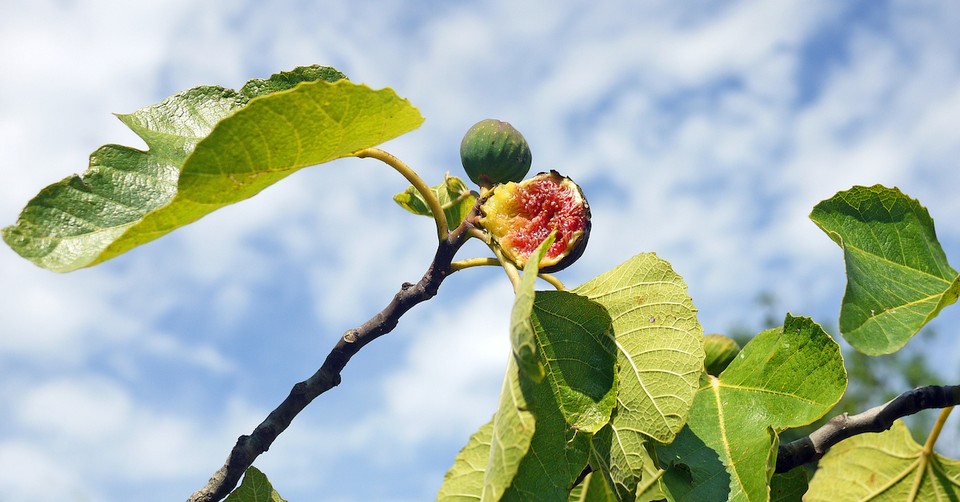Is the Forbidden Fruit Relevant for Christians?

You know the story well. Adam and Eve are blessed to enjoy the vast delights of Eden. The entire garden is open to them, every fruit-bearing tree ripe for the picking. Except one. One tree, placed in the center of the garden, is off limits. The fruit is forbidden. This is the one rule in Eden. The Lord does not hide this fact. This divine command is not wrapped in riddle or mystery. Adam and Eve know exactly from which tree they are not allowed to eat.
Now, scripture does not record for how long the couple held out. Eventually, however, we know the score. Eve is tempted. Adam is tempted. They eat the forbidden fruit. Modern depictions of Eden frequently place the couple standing by an apple tree. This is the fruit typically associated with the tree of the knowledge of good and evil. In fact, so iconic is this association, Steve Jobs chose the bitten apple as the logo for Apple computers. Jobs’ message was clear; his computers were the modern means of obtaining a knowledge of good and evil.
Yet the Bible never actually states that Adam and Eve ate an apple. In fact, the Bible never mentions the type of fruit at all! This undoubtedly leads us to all types of questions: What, then, does the forbidden fruit represent? What was the consequence of eating the forbidden fruit? More to the point, how do we understand the forbidden fruit today, particularly considering Christ’s death on the cross?
What Did the Fruit Represent?
There are plenty of places in Scripture where God’s message is obscured to the plain hearing. God frequently clothes the divine plan in parable, imagery, prophecy, and mystery. In these places, one must sit and wrestle with the image or story, allowing it to germinate within us. The account of the forbidden fruit is not one of those places. When it comes to the instruction given to Adam and Eve, God is forthright and clear. The Lord says to Adam “You may eat freely of every tree of the garden; but of the tree of the knowledge of good and evil you shall not eat, for in that day you eat of it, you will surely die” (Genesis 2;16-17). There is not much wiggle-room to miss the point.
What is more, both Adam and Eve clearly understood this instruction. When Eve is tempted by the serpent barely 12 verses later, Eve reports “We may eat of the fruit of the trees of the garden, but God did say ‘You shall not eat of the fruit of the tree in the middle of the garden, nor shall you touch it, or you shall die” (3:2-3). Message received. One must wonder why God would allow the forbidden fruit to exist in the garden, given that the consequences were so dire. Why did God not remove this obstacle? If this one temptation could potentially destroy Adam and Eve, why not allow them to live in the garden temptation-free?
The answer to these questions is found in God’s desire for a loving relationship. This is the very heart of who God is; the foundation of God’s trinitarian existence. The very act of creation speaks to God’s longing to interact with God’s own people. Yet in God’s gracious love, God desires that we choose to love God. A coerced relationship is never a free relationship. It is never honest, never true. For Adam and Eve to truly abide in faithfulness to God, there must be an option to choose an alternative path. Otherwise, faith would be non-existent, love would be a mirage.
The tree of the knowledge of good and evil represented a choice for the first couple. Would they remain faithful? Would they understand that their life’s satisfaction was rooted in the blessings of their Lord? Or would they take their existence into their own hands? Eating the forbidden fruit would indicate Adam and Eve’s desire to be the arbiters of their own existence. Life would turn inward. Personal desire, rather than faithfulness to God, would govern their lives. Thus, eating the forbidden fruit represented the conscious decision to usurp God from the center of life.
This was exactly the serpent’s temptation. When the serpent whispers to Eve that “God knows that your eyes will be opened and you will be like God” (Genesis 3:5), Eve is led to question the goodness of her creator. Adam and Eve ultimately conclude that their happiness in life is tied to their own self-mastery, and not to faithful obedience to the Lord.
What Was the Consequence of Eating the Fruit?
The consequence of eating the forbidden fruit is clearly spoken: Death. Yet, have you ever noticed that, despite this warning, Adam and Eve do not die after succumbing to temptation? The two remain very much alive. They even proceed to have children. Given this, of what “death” was the Lord speaking?
The death that occurs for Adam and Eve, and by extension, all of humanity is the spiritual death caused by sin. Their spiritual vitality is destroyed. As they bite down on the forbidden fruit the goodness and purity of their lives become corrupted. This is seen as Adam and Eve recognize their nakedness and rush to make coverings. Rather than the personal freedom they hoped to achieve, they feel trapped in guilt; instead of liberation, judgment. Most of all, shame comes flooding into their lives. They look at their bodies (and each other’s bodies) and feel themselves to be inadequate. Even though their bodies have not changed one iota, they inwardly feel that they are not who they should be, and they condemn themselves for it. This internal shame is crippling to the couple, driving a wedge between their relationship. Adam, after all, blames Eve for his own downfall.
More significantly, eating the forbidden fruit creates separation from God. Adam and Eve hide when they hear God walking in the cool of the day. Ultimately, the two are cast out of the garden. The life they knew in Eden, involving unbounded blessings and an intimate fellowship with the Lord, falls away. Sin destroys our relationship with each other, and with God. The death that God speaks of is not physical death but the death of spiritual intimacy. This consequence, or curse, extends to all of humanity. While you or I may not have physically eaten the forbidden fruit, none of us are immune to the effects of Adam and Eve’s sin.
Even today, people continually push God to the side as they attempt to be the lord of their own life. As Paul famously writes: “we all have sinned and fallen short of the glory of God” (Romans 3:23). We all bear this reality. We do not live our lives in total fellowship with God. We still feel the temptation to choose self-mastery over godly obedience, love of self instead of love of God. What is more, you and I have probably succumbed to such a temptation. Because this is applicable to every individual on earth, no one is ever in the place where we can save ourselves. It is the weight of judgment hanging over us all. Yet Jesus changes everything.
Christ’s Curse of the Curse
We cannot miss the fact that God is always gracious. God calls to the hiding couple. God invites them to confess their fault. And even at the point of banishment, God makes coverings for the wayward couple to protect them from the harsh elements. All this takes place even though the intimate bond between Creator and creation has been severed. This is the graciousness of God. Ultimately, this graciousness is fully revealed in the coming of Jesus Christ. Jesus destroys the dominion of sin and death, the result of eating the forbidden fruit. In fact, the Gospels reveal Jesus definitively cursing the forbidden fruit itself. We see this in the seemingly odd instance wherein Jesus curses a fig tree.
While we may depict the forbidden fruit as an apple, the ancient Jewish people associated the forbidden fruit with a fig. This is drawn from the fact that the description of the Garden of Eden only mentions one tree by name: A fig tree. Genesis 3 mentions how Adam and Eve immediately reach for fig leaves upon realizing their nakedness. Even Michelangelo, in painting the Sistine Chapel, rendered the forbidden fruit as a fig, rather than an apple.
Jesus curses the fig tree immediately following his cleansing of the temple. This takes place during the last week of his life, immediately prior to the crucifixion. On the way to his death on the cross, Jesus looks upon the very tree which symbolizes the curse of sin and death, and says, “May no one ever eat of you again” (Mark 11:14). Here, Jesus is not speaking to a solitary fruitless tree, but to the spiritual curse plaguing all humanity. Jesus curses the curse-causing forbidden fruit. Following this, he marches to his passion where he ends the reign of sin and death.
The Forbidden Fruit and Christian Life
As Christians, we recognize two distinct realities for our lives. On one hand, Christ’s death and resurrection free us from the effects of sin and spiritual death. On the other hand, we recognize that we live our lives in a fallen and imperfect world. All creation groans for its final redemption. We ourselves bear these imperfections and these groanings. Although we live in the light of the resurrection, the full inauguration of God’s kingdom has yet to be revealed on earth. Thus, like Adam and Eve in the garden, we may find ourselves tempted to replace Christ’s Lordship with a vision of our own. In these moments, spiritually, we eat the forbidden fruit. We displace our Savior and bow towards a false god: ourselves.
So, what has changed? In short, everything. Jesus has rendered the forbidden fruit utterly powerless. The power of sin and death no longer holds any mastery over those rooted in Christ. Through the death and resurrection of Jesus, Christians enjoy forgiveness and grace. The fruit of the forbidden tree - shame, sin, and ultimately death - has been rendered null and void in the wake of Christ’s loving sacrifice. As St. Paul describes it: “Since death came through a man, the resurrection of the dead comes also through a man. For as in Adam all die, so in Christ all will be made alive” (1 Corinthians 15:21-22). Christ replaces an existence defined by spiritual death with one infused by his own abundant and joyous life. Jesus replaces the forbidden fruit with the fruit of the Spirit.
This means that, in Christ, we are free. This means that the divine intimacy ripped away from Adam and Even has been re-established for us all. Ultimately, beyond all curse, beyond all temptation, and beyond any whispers of the tempter, this means we are saved.
Photo credit: ©GettyImages/Rosmarie Wirz

Originally published June 14, 2021.





